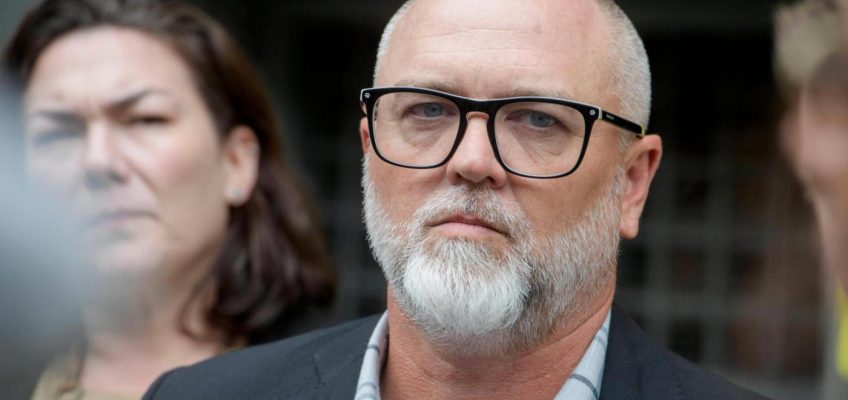Though it’s not unusual to pursue hobbies or accumulate collections, personal wealth means those preoccupations can manifest in more eye-popping ways. Take cars, for instance. Before his death in 2021, Highland Park real estate business magnet Larry Klairmont spent the final two decades of his life amassing a fascinating array of more than 600 historical and unusual vehicles, and put them on display in a museum on Chicago’s Northwest Side. The building’s contents stood as an expression of one man’s eclectic tastes.
That comes to an end this weekend. The museum has closed and the entire Klairmont collection — which in recent years was winnowed down to 284 cars — will be sold by Mecum Auctions. The public can take one last look at the collection Friday (with a $20 entrance fee), then the auction takes place Saturday and Sunday and is strictly for bidders.
Selling off everything is apparently not unusual among auto collectors. It costs money to maintain facilities where cars are housed, and surviving family members may not be as engrossed in the pursuit as their departed loved one. And so, the cars are released back into the world to be collected by new enthusiasts with enough financial firepower to offer a winning bid.
We’re at an interesting inflection point for driving culture. The promise of convenience and practicality remains, while many people want to see more investment in public transit and safer bike lanes — a reduced reliance on cars, in other words — for safety and environmental reasons. The introduction of electric cars, which require different skills (and technology) to repair, has signaled yet another shift. Down the line, fewer amateur mechanics may be able to spend their weekends tinkering with a junker and bringing it back to its former glory.
Whatever our feelings about the role of cars in our lives, the most interesting models have always had an aesthetic — a silhouette — that draws the eye. The best are design achievements, and that seemed to ignite something in Klairmont, who died at 94 but only started collecting, in earnest, in his 80s. A 2017 story in Crain’s noted that his bidding style at auctions was “so rapid-fire and seemingly reckless that strangers sometimes (pegged) him as a shill, put in his seat by management to boost prices that others end up paying.”
This isn’t the first time part of his collection is going up for sale. A few years before his death, he parted with 40 cars. At the time, industry experts estimated his total collection was worth somewhere in the neighborhood of $50 million. But the market tends to fluctuate. Mecum estimates $12-$15 million for this weekend’s auction.
According to Gus Kozar, who is one of the foundation’s board members, proceeds will fund the foundation’s charitable endeavors, including trade school opportunities for those who want to pursue auto restoration and mechanics as a profession: “There’s a shortage of people with those skills right now.”
A 1918 Pierce-Arrow Model 48 Coupe with a custom 23-karat gold exterior on display at Klairmont Kollections Automotive Museum in Chicago. (Terrence Antonio James/Chicago Tribune)
Kozar also works at Mecum Auctions, where his specialty is cars. He and Klairmont became friends more than a decade ago, when the latter became a serious collector.
“Throughout our 12 years, I probably talked to him once a week just about random stuff. It was a fun relationship, for sure,” he said. “Larry was just Larry. He was set in his ways, but he had a humor about it. Everything had to be negotiated. He could be stern about it, but if he pushed too much, he would get this little smile on his face and be like, ‘OK, we’re good.’ He just had to go through the exercise.”
Kozar recalls a routine they had.
“We would go out to lunch all the time and we would get soup. He loved soup. Each time, we’d flip a coin for the bill. No matter who won, I would pay, because, for him, it was about the art of flipping. The sport of it. He was a competitor.”
As for Klairmont’s car collection, “His enjoyment was just walking around, touching the cars and going over all the memories of the era. He was a very unique individual. He loved eccentric and even flashy things, and each one of these cars represented a different vision of the era they were made in. But there were also cars he bought because they were a specific limited color.”
Among the items going up for auction are some midcentury bubbletop cars. Instead of a roof, they have a jet-fighter-esque bubble over the driver and passenger seats.
“They weren’t mass produced,” Kozar says, “but it was great designers and manufacturers predicting what would be the next style that would take off. Custom builders were a huge thing in the ’40s, ’50s and ’60s; everyone was building cars to how they wanted to see them in the future, and these bubbletops evoked a spaceship. So, as men were on the moon in the ’60s, everyone was focused on that. And with a bubbletop, you can see the sky from your car. Now, the best you can get that approximates that is a sunroof.”
A 1955 Ford Beatnik bubble top custom on display at Klairmont Kollections Automotive Museum in Chicago. (Terrence Antonio James/Chicago Tribune)
There are a few three-wheeled cars, as well.
“There are some micro-cars that are three-wheeled and a custom one called the Vortex. Some were built off motorcycle chassis that were extended in the back to have two wheels instead of one to give it more balance, but it was also lighter, more agile and more fuel efficient than a regular car. And just smaller; a lot of them were European, because of how narrow the streets are there.”
Kozar anticipates the top prices will go to a 1926 Rickenbacker, which is “extremely rare. Over the past 15 years, everybody has been chasing that car. That car is very significant in the car world, so it will definitely go for six figures. A conservative number could be between $400,000 and $600,000.”
Another contender is a 1959 Golden Sahara.
“That’s one of his custom cars. That car made world news when he purchased it about seven years ago. It’s probably the most famous car that he owned. Goodyear contacted him because back in the ’50s, they had illuminated tires — illuminated from the inside — so when he bought the car, Goodyear worked with him to re-develop those tires and then they took the car on tour.”
On the lower end, Kozar anticipates many vehicles will go for $10,000 to $25,000. (Aside from the Rickenbacker, prices for cars from the ‘20s and ‘30s have been going down, he says, “just because interest is going down. As the cars get older, people who remember them are aged out. So the cars are still valuable, but not as valuable.”)
The cars aren’t necessarily road-ready or street legal. Klairmont wasn’t driving them; Kozar typically saw him in a newer Rolls-Royce. “He was driving until he was 92, I think. I remember going out to lunch with him and he picked me up and I thought, ‘Hmm, OK.’ And he pulled up in this big — very large — late model Rolls-Royce. He was proud to show it to me, but it was like a mile long. I was like, I don’t know if even I could drive this. “
Also up for auction is Klairmont’s collection of road art, which is car memorabilia, including dealership signs and posters.
Obama says the US is at ‘an inflection point’ after Kirk’s killing and Trump has divided the country
Foreign disinformation about Charlie Kirk’s killing seeks to widen US divisions
Tariffs, bird flu and severe weather are pushing some everyday groceries to record prices
Connect Four, lightsabers, Furbies … and snow: Which playthings belong in the Toy Hall of Fame?
Immigrant children at Texas detention facility face unsafe conditions, attorneys say
A late-in-life obsession comes to an end
Klairmont and his wife, Elaine, had five children together, including son Alfred, who says his father was “quite fabulous and quite unique. My dad was the best businessman I ever encountered. Self-taught. He never missed a trick.”
But his father always had an eye for unique cars.
“In the late 1960s, he was able to buy his first collectible car, a 1951 Rolls-Royce, which he just loved. It was not his daily car because it was a lemon (laughs) and it was in the shop more times than it was available to be on the road.”
Then, over the years, Klairmont bought a few more cars, here and there.
“As a teenager or in my early 20s, I might drive one of these cars and I would be stopped by gapers who wanted to see it, or would ask if they could buy it. There are car aficionados everywhere. You wouldn’t believe how many there are, and how engaged they are.”
Later, Alfred’s role was to ensure the payments for Klairmont’s latest car purchase went through.
“He’d say, ‘Al, overnight them a check.’ That was my role.”
A few years after the 2008 death of Klairmont’s wife, he embarked on a new relationship with Joyce Oberlander, who was influential in encouraging him to turn his collection into a museum.
A Chicago native and child of the Depression, “he had a very hard childhood, they were ‘on relief.’ And I think he developed a hoarder’s mentality,” Alfred says.
He eventually found himself with multiple duplicates, which is why his collection swelled to the 600 range, before he decided to pare back and “cleanse,” as Kozar puts it. This weekend will be the final cleanse.
Klairmont’s interests also extended to slot machines. Nothing to do with cars, mind you.
“I think there are 10 to 15 and they date from the early ‘20s all the way up to the ‘80s,” Kozar says. “He just liked to see the progression of how the world changed, as visualized through slot machines.”
He also collected watches.
“He bought thousands of wristwatches,” says his son. “After he passed away, we sold the valuable watches and passed some watches around to family. And then, in the end, we donated 800 watches to the car collection.”
Per Kozar, the slot machines will be part of this weekend’s auction. The watches will not; their future is “yet to be determined.”
A 1952 Chevrolet Custom Coupe on display at Klairmont Kollections Automotive Museum. (Terrence Antonio James/Chicago Tribune)
The museum stuck around for four years after Klairmont’s death. Why sell now?
“It came down to a financial decision for the board, which figured the amount of money it was spending to keep the museum open was significant,” says Kozar. “Larry’s vision, originally with Joyce was to give back to the community, so the board decided to restructure the foundation to help young people with scholarships to automotive trade schools.”
Alfred has mixed feelings about the end of his father’s museum.
“I’m not happy about it,” he says gently. “It was not my decision in the end. My dad wanted this to be his legacy. Now it’s ending. On the other hand, it was very costly to keep going. The museum had its run.”
Though Klairmont’s collection will cease to exist, there is another nearby auto museum about 90 minutes outside Chicago in Volo, Illinois, called — handily enough — the Volo Museum. It’s home to a wide variety of vehicles, including many that were used in movies, including the 1975 Dodge Monaco “Bluesmobile” in “The Blues Brothers,” the 1959 Cadillac Ecto-1 in “Ghostbusters” and the Batmobile known as Tumbler in “The Dark Knight.”
According to Brian Grams, Volo Museum’s director, it’s not uncommon for people to confuse their collection with Klairmont’s — so much so, he’s been receiving calls asking if they are going out of business. In fact, Klairmont bought some of his cars from the Volo enterprise over the years.
Grams was philosophical about the upcoming auction.
“We see this quite a bit. A wealthy person will amass these amazing collections, which are then eventually sold piecemeal, creating a new Larry Klairmont somewhere else.”
The building where the cars are stored is not a parking garage with easy access and egress. Kozar says the process of loading everything out will take place over several weeks and anticipates the exit plan will be a valet game of Jenga.
“It’s going to be, ‘You gotta move these four cars to get those two cars out.’ It’s going to be pretty intense.’’
The cars fill every inch of space. But one by one, they will eventually be loaded onto a truck and towed into the sunset.
The “Larry’s Legacy” event will be Sept. 19-21 at Klairmont Kollections Automotive Museum, 3117 N Knox Ave.; more information and preregister to bid in the auction at www.mecum.com




